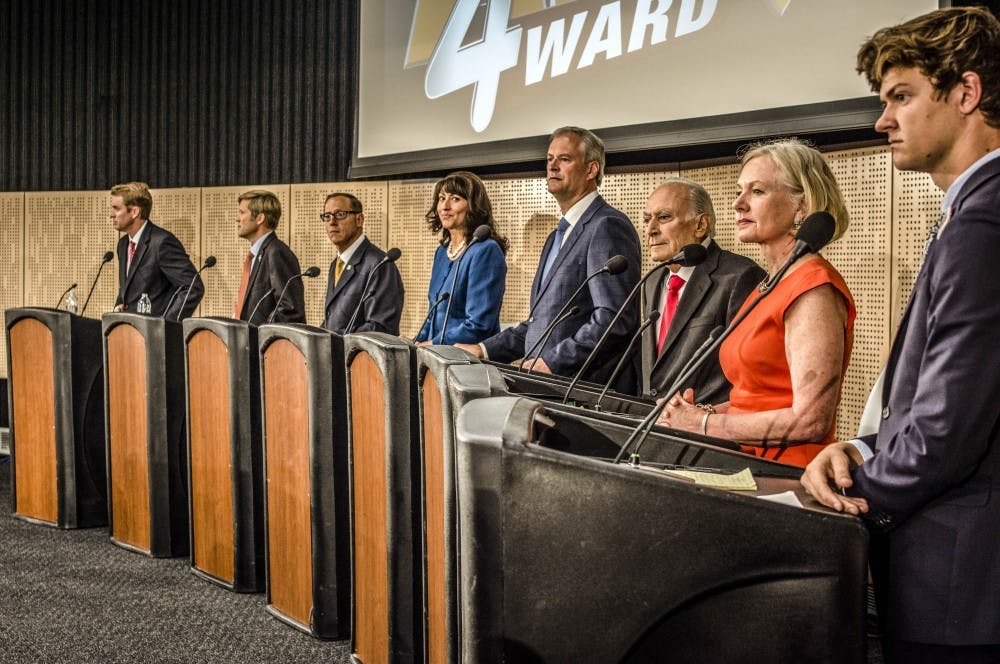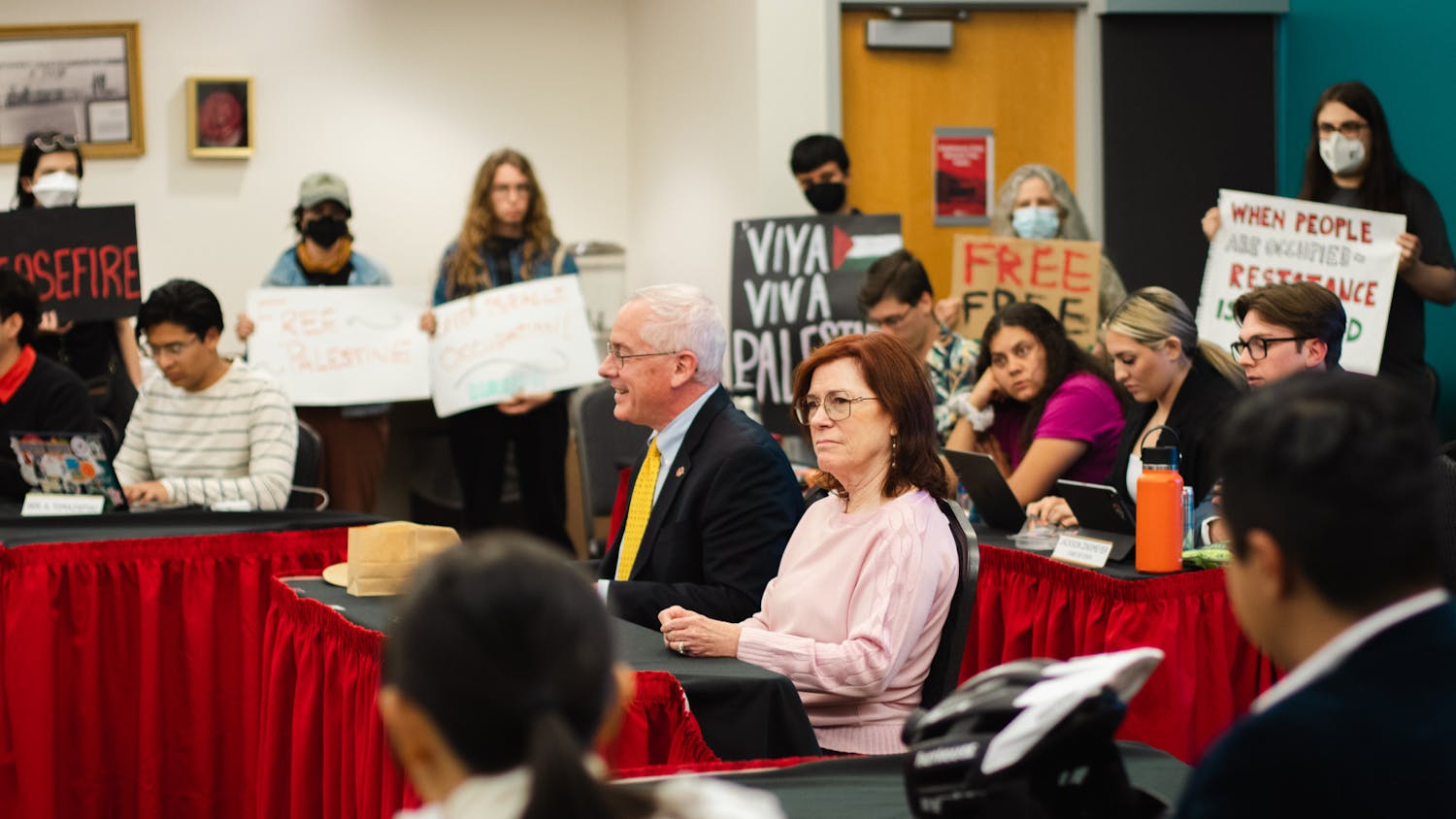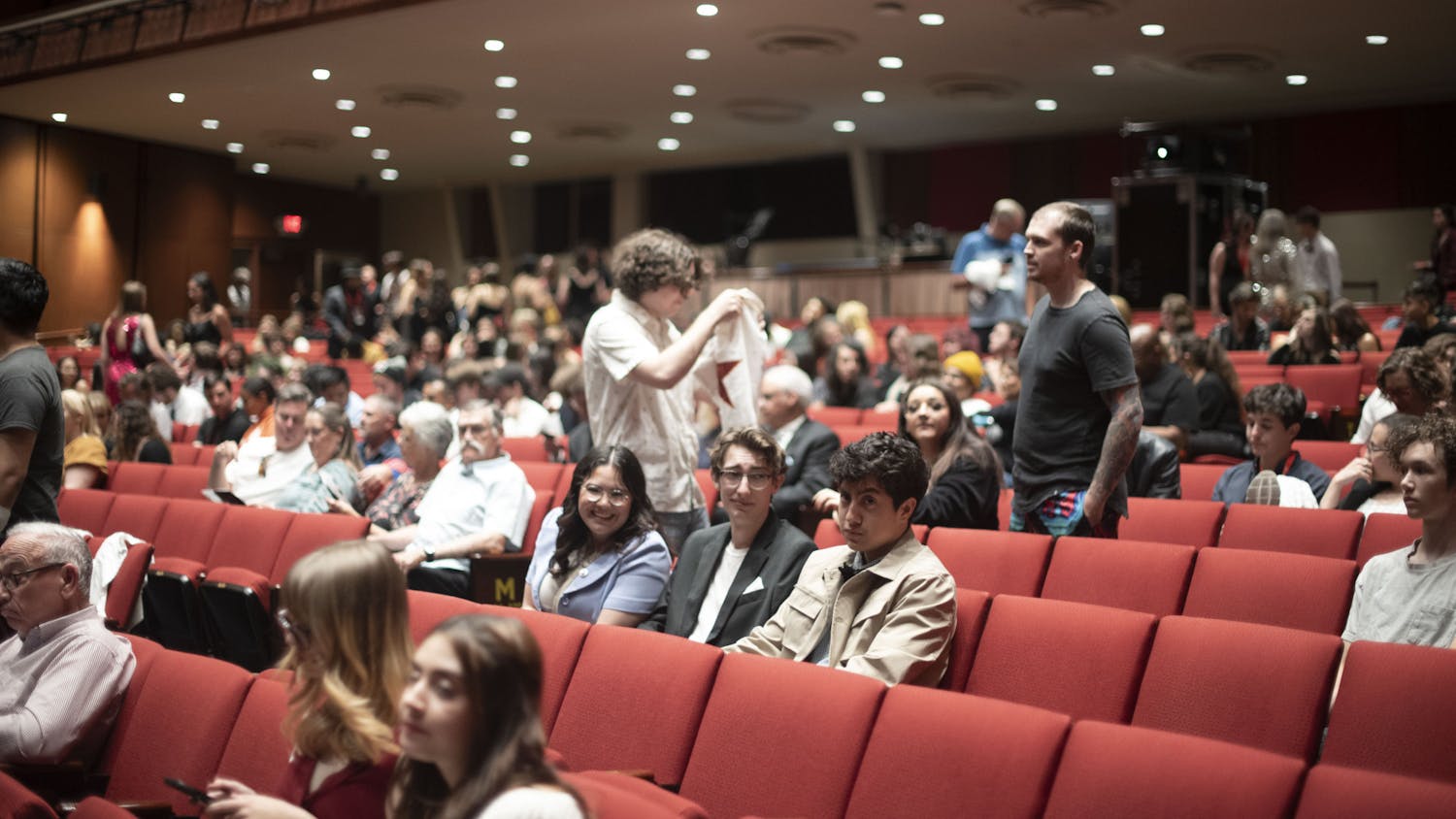The eight balloted Albuquerque mayoral candidates gathered Friday, Sept. 25 in Smith Brasher Hall at Central New Mexico Community College to answer city residents’ questions.
The candidates — Ricardo Chaves, Brian S. Colón, Michelle Garcia Holmes, Wayne Johnson, Timothy “Tim” Keller, Daniel “Dan” Lewis, Augustus “Gus” Pedrotty and Susan Wheeler-Deichsel — treated each other in a friendly manner after taking to their podiums, with Garcia Holmes and Johnson taking a selfie, while Wheeler-Deichsel and Pedrotty spoke before the broadcast began.
Local broadcast station KOB hosted the forum, using reporters positioned at four locations across the city to develop and deliver questions from the community.
Crime was the main focus for a large part of the forum, with questions concerning how the candidates plan on handling crime in Albuquerque and what they think is causing the city’s systematic crime rate.
“First, we have to rebuild the morale in the police department,” Colón said, in response to a question regarding APD. “We will not have 400 officers if we do not save the culture. We’ve got to make sure everyone knows that the APD is on its way to becoming the gold standard law enforcement like it once was.”
Garcia Holmes said during her former service at the police department, she served under five different mayors, giving her the opportunity to see the mistakes they made.
“The city needs more community policing,” she said. “Community policing is important. To work into a good community policing model, we need to get to 1,300 police officers. We can do this, Albuquerque, I know we can we have money in the budget to do it. I won’t be a mayor who spends money on pet projects.”
Questions from the different locations varied to different degrees, remaining on the topic of crime and yet focusing on the different aspects that Albuquerque is currently wrestling with. One of these questions concerned Albuquerque’s abandoned buildings, asking candidates what they would do about the facilities if they were elected.
Johnson stated that while the City of Albuquerque has some issues with crime, secure neighborhoods need to be created to encourage new development.
“It’s fundamentally about how you use your real estate and how your zoning is done,” he said. “Frankly, we got some areas and strip malls across this city that are in decay, and we have to work with those owners to repair those properties. And I’m not saying force them to do it, but I’m saying incentivize them to do it.”
Chaves — a business owner himself — wants to focus on programs to refurbish old buildings, such as those used in other cities by nonprofits, and rent them to the homeless at a low price.
“This is done by nonprofits, it doesn’t cost the city anything,” he said. “It lowers homelessness from 97 percent to three percent.”
Get content from The Daily Lobo delivered to your inbox
As the forum continued, questions narrowed, and one question asked how candidates would improve the image of the APD for citizens.
Garcia Holmes said she hopes to bring back old programs, which brought officers to schools to teach curriculums such as studies on gang resistance, education and training.
“It’s really important; we have a gang problem in Albuquerque,” she said. “Our young people are very, very vulnerable to becoming part of gangs. Especially at the middle school ages, and it was a great program. It was such a wonderful program, but it has since been decimated.”
Keller’s response focused on how to restore the trust between APD and the public — he said he believed the focus should be on a series of steps, one of which would be to to re-ordinate the entire police department around community policing.
“That’s not a word that we throw around,” Keller said. “That’s a series of manuals, policies, beliefs and philosophies that many police departments use. And we actually used to use this.”
Lewis believes the answer lies with neighborhood policing, in that, while there may not be an officer on every street, there will be an officer that knows every neighborhood in the city.
“These are officers that are more peacekeepers than they are enforcers, but it starts by ensuring that we have the capacity of officers to be able to perform neighborhood policing,” he said.
The questions transitioned to how the candidates would reduce crime, using other cities as models.
Pedrotty said the big names on anybody’s list were going to be New York, Boston and Los Angeles — who have all had massive overhauls but have also had issues that were particular to each community. Understanding the difference between how these communities are set in contrast to Albuquerque’s were key, he said.
“How do we make sure that community policing doesn’t go back to things that led us to stop it?” he said. “How we do that is making sure we don’t stereotype communities. We make sure this is about having conversations and not just handing out citations based on poverty.”
Questions regarding gun-related crime and the candidate’s willingness to try programs to reduce drug addiction followed. The candidates were also asked how they would be held accountable for their administration.
Wheeler-Deichsel sought to update the official website that provides information on how the city and the current administration is performing.
“We do have these metrics available,” she said. “We do have lots and lots of things we track. The average citizen out there does not know how to track them. If they’re computer literate, there are ways they could go on our very archaic, very difficult-to-use website and access some of the data they’re looking for.”
Near the end of the forum, candidates were asked if they would be willing to warn tourists of the city’s high crime rate, while still promoting Albuquerque’s beauty, if elected as mayor.
This was the only question candidates asked to be repeated.
“Let’s talk about some of the incidents that have happened to the tourists of our city,” Garcia Holmes said. “Just the other day, a car got stolen, and it had a casket in it. We’re in the national news over the crime in our city. Number one: we have to get somebody in the mayor’s office that can tackle crime immediately and hit the ground running.”
Pedrotty focused on taking the responsibility of the crime that is happening in Albuquerque and then telling those entering the city how it is being managed.
“Yes, this is real,” he said. “Albuquerque has been on national news for its crime issue for a long time. Longer than I’ve been alive. Right, not super long. So yes, there are so many things we’re talking about on how wonderful our city is, but let’s tell you how we also know how to fix our own problems, so you can look forward to being safe here and having the time of your life in Albuquerque.”
At the end of the debate, the candidates were thanked for their participation, and each gave closing statements, highlighting the reasons they believed they were all skilled and qualified to become the next Mayor of Albuquerque.
Nichole Harwood is a news and culture beat reporter at the Daily Lobo. She primarily covers alumni and art features. She can be contacted at news@dailylobo.com, culture@dailylobo.com or on Twitter @Nolidoli1.






